SBIIIM2-2reading & vocabulary,pronuncition
人教版八年级英语下册Unit3SectionB(2a2e)Reading教学设计

为了巩固本节课的学习内容,确保学生对一般过去时态和新词汇的掌握,特布置以下作业:
1.书面作业:
a.根据本节课所学的词汇和短语,编写一段关于自己参加才艺表演的短文,要求运用一般过去时态描述表演的过程和感受。
b.完成课后练习册中与本节课相关的练习题,包括填空、选择和回答问题等,以检验学生对文章内容的理解。
2.教学目的:
通过展示与文章主题相关的图片和提问,激发学生的兴趣,为新课的学习做好铺垫。
3.教学内容:
引导学生谈论自己对才艺表演的看法,为新课中阅读文章的学习做好准备。
(二)讲授新知
1.教学活动设计:
教师引导学生学习本节课的新词汇和短语,如:amazing, confident, performance, audience等。通过例句、同义词、反义词等形式,帮助学生理解和记忆新词汇。
作业布置的目的是为了让学生在课后能够自主复习和巩固所学知识,同时提高他们的英语综合运用能力。教师应在下节课前检查作业完成情况,给予及时的反馈和指导,帮助学生不断进步。
d.课堂活动:组织学生进行小组讨论,分享阅读心得,提高学生的口语表达能力。
e.课后作业:布置与课堂内容相关的作业,巩固学生对一般过去时和新词汇的掌握。
3.教学评价设想:
a.过程性评价:关注学生在课堂上的参与度、合作学习表现以及阅读策略的运用,及时给予反馈,鼓励学生持续进步。
b.结果性评价:通过课后作业、阶段测试等方式,了解学生对一般过去时和新词汇的掌握程度,以及对文章的理解程度。
3.教学内容:
练习题涵盖文章的主要知识点,包括一般过去时态的运用和新词汇的运用。
(五)总结归纳
1.教学活动设计:
教师带领学生回顾本节课所学内容,总结一般过去时态的用法、新词汇和短语、文章主旨大意等。
高中二年级下学期英语《选择性必修三 Unit 2 Reading and Thinking》教案

Unit 2 Healthy LifestyleReading and thinking教学设计教学目标与核心素养:After the class,students are able to:1.know the main idea of this passage.2.read quickly to find some specific information about habits for a healthy lifestyle.3.learn to correct a bad habit.教学重难点教学重点:Scanning and skimming.教学难点:Let students be interested in English.课前准备:多媒体,黑板,粉笔教学过程:一、Pre-class1. Greeting2. Warming-upQ: What kind of person can be regarded as a healthy person?WHO: A state of complete physical, mental, and social well-being.3.学生一起完成一个有关健康生活方式的问卷调查。
(1)Do you sleep at least 8 hours every night?(2)Do you have breakfast every morning?(3)Do you smoke?(4)Do you drink alcohol?(5)Do you exercise for at least 1 hour each day?(6)Are you under too much stress?(7)Are you used to blaming yourself?(8)How often do you feel angry?(9)How often do you feel lonely?(10)How often do you need to visit the doctor?根据选项打分,判断自己的生活方式是否健康。
朗文 3B U2 Reading
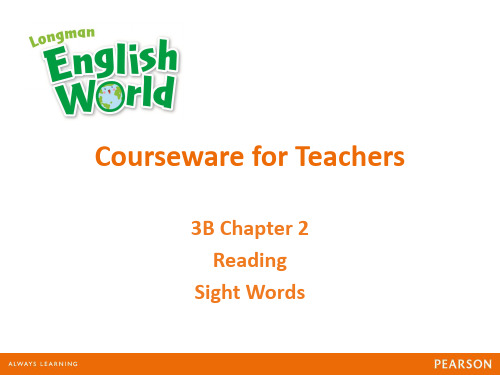
Let’s discuss. Discuss in groups
What makes a good friend?
Let’s discuss.
Does a good friend always play with you?
Retell
Name What they do/What he does to Mark? play tricks on What is he like?
They are best friends!
First-reading
Please read the passage carefully.
1. What is Edward like?
2. What is Mark like?
First-reading
Name some children Edward Name In what way? What they do/What he does to Mark? What is he like?
1. listen & read 2. Q&A Words 3. board
Look at the picture. What is the girl doing?
Is she being kind to Mark?
Let’s read the descriptions.
What does ‘play tricks’ mean?
Do all the children play with Mark?
Why not?
Let’s read the descriptions.
Mark is different from the others but Edward still plays with him.
译林版高中英语选必三Unit2 Reading and Extended reading 课文
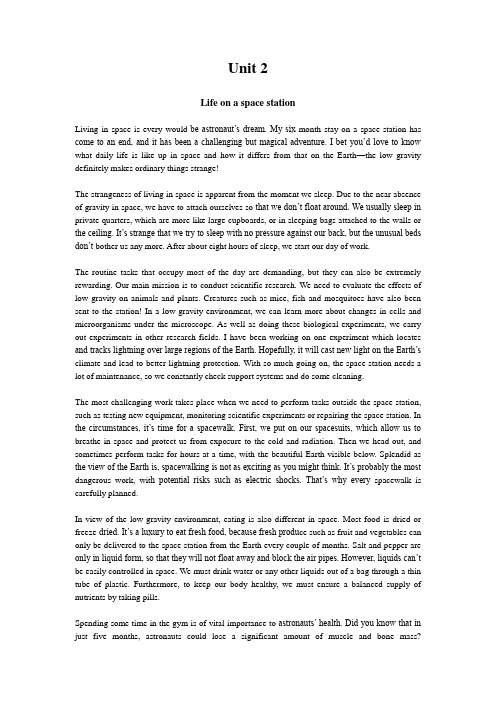
Unit 2Life on a space stationLiving in space is every would-be astronaut’s dream. My six-month stay on a space station has come to an end, and it has been a challenging but magical adventure. I bet you’d love to know what daily life is like up in space and how it differs from that on the Earth—the low gravity definitely makes ordinary things strange!The strangeness of living in space is apparent from the moment we sleep. Due to the near absence of gravity in space, we have to attach ourselves so that we don’t float around. We usually sleep in private quarters, which are more like large cupboards, or in sleeping bags attached to the walls or the ceiling. It’s strange that we try to sleep with no pressure against our back, but the unusual beds don’t bother us any more. After about eight hours of sleep, we start our day of work.The routine tasks that occupy most of the day are demanding, but they can also be extremely rewarding. Our main mission is to conduct scientific research. We need to evaluate the effects of low gravity on animals and plants. Creatures such as mice, fish and mosquitoes have also been sent to the station! In a low-gravity environment, we can learn more about changes in cells and microorganisms under the microscope. As well as doing these biological experiments, we carry out experiments in other research fields. I have been working on one experiment which locates and tracks lightning over large regions of the Earth. Hopefully, it will cast new light on the Earth’s climate and lead to better lightning protection. With so much going on, the space station needs a lot of maintenance, so we constantly check support systems and do some cleaning.The most challenging work takes place when we need to perform tasks outside the space station, such as testing new equipment, monitoring scientific experiments or repairing the space station. In the circumstances, it’s time for a spacewalk. First, we put on our spacesuits, which allow us to breathe in space and protect us from exposure to the cold and radiation. Then we head out, and sometimes perform tasks for hours at a time, with the beautiful Earth visible below. Splendid as the view of the Earth is, spacewalking is not as exciting as you might think. It’s probably the most dangerous work, wit h potential risks such as electric shocks. That’s why every spacewalk is carefully planned.In view of the low-gravity environment, eating is also different in space. Most food is dried or freeze-dried. It’s a luxury to eat fresh food, because fresh produ ce such as fruit and vegetables can only be delivered to the space station from the Earth every couple of months. Salt and pepper are only in liquid form, so that they will not float away and block the air pipes. However, liquids can’t be easily controlled in space. We must drink water or any other liquids out of a bag through a thin tube of plastic. Furthermore, to keep our body healthy, we must ensure a balanced supply of nutrients by taking pills.Spending some time in the gym is of vital importance to astronauts’ health. Did you know that in just five months, astronauts could lose a significant amount of muscle and bone mass?Considering these negative effects low gravity has on the human body, we discipline ourselves to do at least two hours of exercise every day. Exercise in space is not your average workout. We have to be tied onto specially designed exercise equipment to stop ourselves from floating around.During our leisure time, there’s nothing we like more than to sit back wit h the rest of the crew and watch our remarkable planet go by, taking pictures for our family and friends back home. As the space station travels at a speed of about 17,500 miles per hour, we get to see the sunrise every 90 minutes. In these precious moments, all the challenges of life in space seem worth it.Why we exploreIn 1969, when Neil Armstrong first landed on the Moon, many people thought that soon we would be regularly visiting other planets in our solar system and would even dare to travel beyond it. This is clearly not the case. The reality is that space exploration is extremely difficult and dangerous, can take a very long time and costs a huge amount of money. Some people believe that while space exploration expands our understanding of the universe, it is a waste of the public purse and does nothing to enhance the quality of our lives here on the Earth. Why do we continue to explore space, then?It is in our nature to explore. From the very early days of human life on the Earth, our curiosity about the unknown has kept us adventuring into new places. We long to visit thick and wild forests, climb vast mountain ranges, and cross deep oceans. We desire to explore the furthest frontier of all—space. As Stephen Hawking once said, “Remember to look up at the stars and not down at your feet. Try to make sense of what you see and wonder about what makes the universe exist. Be curious.” That we are fascinated by the sky is evident in ancient tales from around the world, such as that of Chang’e. While sp ace exploration is a reality, we remain curious about the mysteries of the universe. With each space mission comes greater insight, thus motivating us to continue along the same path of adventure.The results of these space investigations have made major contributions to an understanding of the origin, evolution, and likely future of the universe, such as planets, stars, and all other forms of matter and energy. Exploring space helps address fundamental questions about our place in the universe and the history of our solar system. It is through our research into space that we have confirmed that the Earth is round and that it orbits the Sun. As we learn more about the universe, we may one day answer the question whether there is life on other planets.With technologies first researched and developed for space exploration, we can solve some of the big problems facing mankind, making our lives safer and easier. One of these is earthquake shock absorbers. Shock absorbers originally applied to the space shuttle launch have also been set up in the cities with a high frequency of earthquakes in order to protect buildings and save lives. Some technologies need further research to better solve real-life problems. For example, liquid hydrogen is a clean alternative energy source that is used widely as rocket fuel, and it is likely that hydrogen fuel cell vehicles will be mass-produced and launched in the near future. These scientific and technological advances can provide benefits to societies on the Earth in many areas including health, energy and information technology. This should be a strong motive for continuing to explore space.Although space exploration demands huge investment, the space industry can actually bring great economic value. It has been calculated that the global space economy is increasing by billions of dollars every year. At the same time, space exploration can provide a variety of career opportunities for young people. Jobs in the space industry go far beyond the astronauts that receive widespread media coverage. There are many support staff on the ground, such as engineers, mechanics and research assistants.Moreover, the amazing work these people do can provide education and inspiration for the next generation. For me personally, this is by far the biggest reason for humanity to explore space. Such wonders as a space shuttle launch or astronauts walking on the Moon are incredibly exciting and inspiring to witness, and it can be these moments that shape children’s lives forever and motivate them to become the scientists and engineers of the future. It is this kind of inspiration that keeps our thirst for knowledge alive and ensures that advances in space exploration and many other fields will continue to be made. When you have seen a man walk on the Moon, you grow up believing that anything is possible!。
B3M2 Period 2 Reading 操作实例
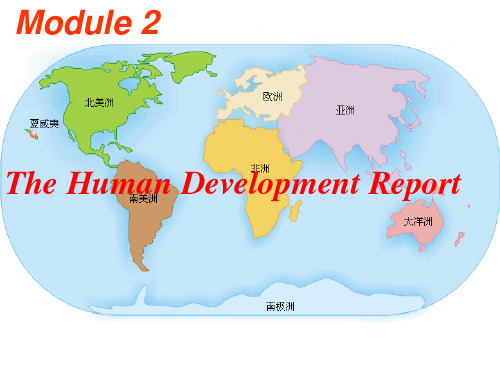
13 years 150 million
799 million
115 million 1 billion
• In order to reduce poverty by 2015 or earlier, an investagation about the human developmemt was ____________in carried out 2000. In the report, the Human Development Index is a very important part, showing the ___________of achievement 175 countries in 3 ways: life expectancy, education and income. To people’s_______, surprise Norway comes first ______the while US ranks number 7 on the list.The report also description 8 Development Goals, such gives a __________of as reducing poverty and hunger, making sure all education children have ___________up to the age of 11, fighting AIDS and other diseases, and so on. In the 2003 Human development Report, examples development are given about successful______________.
B2U3_Reading2

Book 2 Unit 3 Festivals and customsReading 2Alex around the world教学目标By the end of this section, students will be able to:1. understand and appreciate the difficult sentences in the travel journals;2. use new words and expressions in appropriate situations;3. explore the metaphors and apply metaphors correctly;4.extend their vocabulary of countries.教学重难点1. To understand and appreciate the difficult sentences;2. To use the new words and expressions appropriately;3. To explore the functions of metaphors and apply metaphors correctly.教学过程步骤教学活动设计意图互动时间&模式RevisionStep 1 The teacher invites students to go through the two travel journals quickly and think about thefollowing question.Besides weddings and festivals, what otherelements are an important part of a country’scustoms and traditions?Students discuss in groups while making a list andthen describe one after another.通过设问,让学生回顾文本,内化所学,在此基础上延伸拓展,迁移创新语言能力,提升思维品质。
九年级英语下册Unit3RobotsReading2教案(新版)牛津版

- Future development:未来发展的英文表达。
- Impact:影响的英文表达。
③重点句型和表达
- "Robots are becoming increasingly common in everyday life, serving as helpful assistants in homes, medical devices in hospitals, and industrial workers on production lines.":机器人正在变得越来越普遍,它们在家庭中作为助手,在医院中作为医疗设备,在生产线上作为工业工人。
-教师围绕课文内容,讲解机器人在日常生活中的应用以及未来机器人可能带来的变化。
-教师通过示例和练习,讲解和示范课文中的长难句和复杂语法-教师给出一些练习题,让学生独立完成,巩固对课文内容的理解和掌握。
-学生互相交流答案,教师进行点评和讲解。
4.师生互动环节(10分钟)
学情分析
九年级的学生已经具备了一定的英语基础,能够理解和运用基本的英语词汇和语法知识。然而,对于一些较长的课文和复杂的句子结构,学生可能会感到困难。因此,在教学过程中,教师需要帮助学生理解和分析课文中的长难句和复杂语法结构,以提高他们的阅读理解和语言运用能力。
此外,学生对于机器人的了解可能局限于一些表面的知识,对于机器人背后的技术和未来发展可能缺乏深入的理解。因此,在教学过程中,教师需要引导学生深入思考机器人在日常生活中的应用以及未来机器人可能带来的变化,以培养他们的文化意识和思维品质。
教学方法与手段
1.教学方法
-互动式教学:通过小组讨论、角色扮演等形式,激发学生的学习兴趣,提高他们的参与度和主动性。
译林版高中英语选必三Unit2 Extended reading 名校教案

Unit 2 Out of this worldExtended reading: Why we explore◆内容分析:【What】本板块的语篇取材于杂志,围绕人类探索太空的原因,从五个层面展开论述:探索未知是人类的天性;太空探索,有助于人类理解宇宙的起源、演变和未来发展;在太空探索中所取得的技术进步可用于解决人类面临的某些重大问题;太空探索能带来巨大的经济价值;太空探索可以教育和启迪下一代。
【Why】本文通过引导学生探讨太空探索的意义,使学生了解人类航空航天事业发展的历史与现状,关注我国太空探索所取得的成就与突破,从而激发学生探索太空的兴趣,增强民族自豪感。
【How】本文的语篇类型为议论文,文章结构清晰,论点明确,逻辑性强,说理严谨,作者开篇设问:太空探索既充满危险与挑战,又耗费大量财力物力,人类为何仍然坚持进行探索?随后作者从五个层面论述了其背后的原因,通过引用名人名言、列举事实、提供数据等论证手段来展开论述。
◆教学目标:By the end of this section, students will be able to:1. summarize the author’s arguments for space exploration;2. identify the structure and features of the argumentative essay;3. critically analyse the advantages and disadvantages of space exploration;4. strengthen their desire to further explore the unknown field in science.◆教学重难点:Students will figure out a little bit hard for them to:1. analyse the advantages and disadvantages of space exploration;2. express their own attitudes towards space exploration.◆教学过程:Step 1 Lead-inEnjoy a video, introducing some cartoon characters who are exploring the space.After watching the video, students get to talk about the reasons for exploring the space. Another video is provided.Step 2 Fast readingMain ideas of paragraphsListen and then tell the main ideas of each paragraph.Para.3: To better understand the origin, evolution, and likely future or the universePara.4: To solve big problems and make our lives safer and easierPara.5: To gain great economic valuePara.6: To educate and inspire the next generationReview the main ideas of paragraphsKeywords are given on the screen:Para.1: Why?Para.2: curiosityPara.3: understandingPara.4: problem-solvingPara.5: economic valuePara.6: education & inspirationReasons for space explorationHave students talk about the reasons for space exploration:•It is our nature to explore.•It enables us to learn more about the origin, evolution, and likely future of the universe.•Technologies first researched and developed for space exploration can be used to solve some of the big problems on the Earth.•We profit economically from the space industry and it also creates jobs.•It educates and inspires the next generation.Step 3 Careful readingHave students read each paragraph and answer the questions:Para. 1:Q: What is the reality of space exploration?A: Line3—Line5.Q: Why does the author tell a true story at the beginning of the first paragraph?A: To encourage the reader to think about why humans did not regularly visit other planets in the solar system after Armstrong’s landing on the Moon and also to introduce the fact that actually exploration is extremely difficult and dangerous.Para. 2:Q: What is our nature in exploration?A: Our curiosity about the unknown has kept us adventuring into new places.We long to visit thick and wild forests, climb vast mountain ranges, and cross deep oceans.翻译:我们渴望探索茂密的原始森林,攀登广袤的山脉,越过深邃的海洋。
M3U2 reading教案
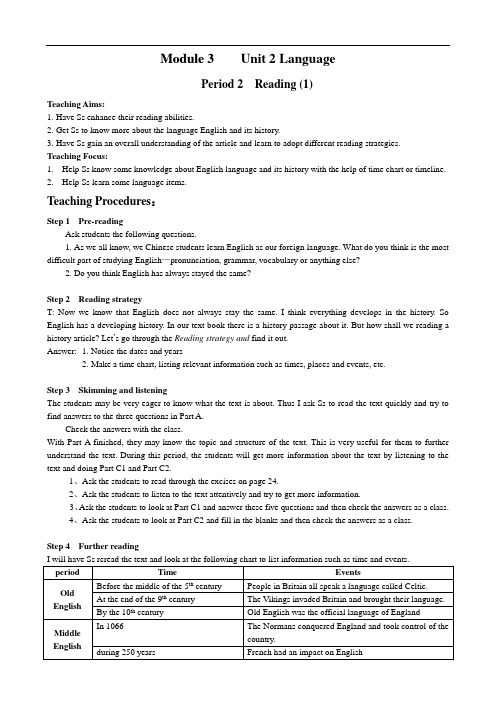
M o d u l e3Unit 2 LanguagePeriod 2 Reading (1)Teaching Aims:1. Have Ss enhance their reading abilities.2. Get Ss to know more about the language English and its history.3. Have Ss gain an overall understanding of the article and learn to adopt different reading strategies.Teaching Focus:1.Help Ss know some knowledge about English language and its history with the help of time chart or timeline.2.Help Ss learn some language items.Teaching Procedures:Step 1 Pre-readingAsk students the following questions.1. As we all know, we Chinese students learn English as our foreign language. What do you think is the most difficult part of studying English—pronunciation, grammar, vocabulary or anything else?2. Do you think English has always stayed the same?Step 2 Reading strategyT: Now we know that English does not always stay the same. I think everything develops in the history. So English has a developing history. In our text book there is a history passage about it. But how shall we reading a history article? Let’s go through the Reading strategy and find it out.Answer: 1. Notice the dates and years2. Make a time chart, listing relevant information such as times, places and events, etc.Step 3 Skimming and listeningThe students may be very eager to know what the text is about. Thus I ask Ss to read the text quickly and try to find answers to the three questions in Part A.Check the answers with the class.With Part A finished, they may know the topic and structure of the text. This is very useful for them to further understand the text. During this period, the students will get more information about the text by listening to the text and doing Part C1 and Part C2.1、Ask the students to read through the excises on page 24.2、Ask the students to listen to the text attentively and try to get more information.3、Ask the students to look at Part C1 and answer these five questions and then check the answers as a class.4、Ask the students to look at Part C2 and fill in the blanks and then check the answers as a class.Step 4 Further readingGet the students to make clear the people who got into Britain in different times and the development of language with the help of some maps and charts.Go through the examples of words in the text together.Summarize the text with the help of a time line.Step 5 ExercisesHave students look at the following True or False exercises. The aim of the task is to check if the students have got the information of the text.1.Old English consisted of an Anglo-Saxon base plus words from the languages of French and Norway. F2.In 1066, the Normans took control of the country and English was replaced with French. F3.The words for most animals come from old English just because the animals were raised and cooked byEnglish servants. T4.English was used for all official occasions after the Norman Conquest. F5.People from different places sometimes misunderstand each other though they both speak English. TStep 6 DiscussionLanguage borrows words from each other. Please list some of them.Chinese word s from English: 咖啡,沙发,模特儿,摩登,引擎,三明治,汉堡等Homework1.Read the text after class.2.Do the exercises on Page98 of the workbook.Period 3 Reading (2) (Language points)Teaching Objectives:1.To understand the text better2.To master some useful words and expressionsStep 1. Revision:plete the passage on P25.2.Match the new words.Step 2 Language points1.be made up of●The medical team was made up of twelve doctors. 医疗队由十二名医生组成。
高中英语:M2U3READING(II) 教案 牛津版必修3
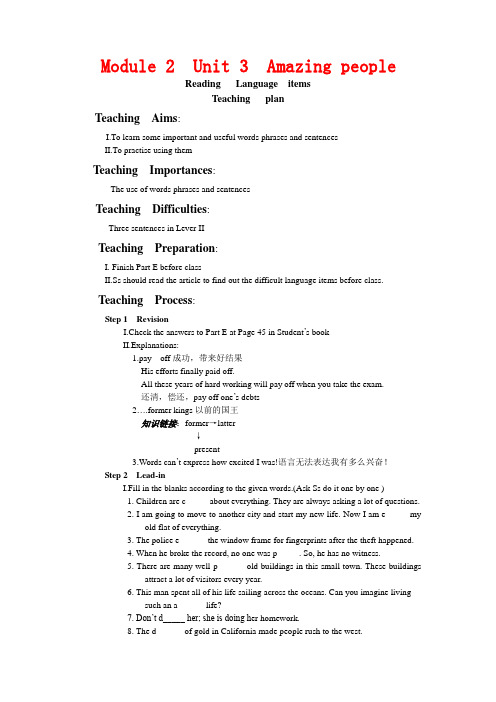
Module 2 Unit 3 Amazing peopleReading Language itemsTeaching planTeaching Aims:I.To learn some important and useful words phrases and sentencesII.To practise using themTeaching Importances:The use of words phrases and sentencesTeaching Difficulties:Three sentences in Lever IITeaching Preparation:I. Finish Part E before classII.Ss should read the article to find out the difficult language items before class. Teaching Process:Step 1 RevisionI.Check the answers to Part E at Page 45 in Student’s bookII.Explanations:1.pay off成功,带来好结果His efforts finally paid off.All these years of hard working will pay off when you take the exam.还清,偿还,pay off one’s debts2….former kings以前的国王知识链接:former→latter↓present3.Words can’t express how excited I was!语言无法表达我有多么兴奋!Step 2 Lead-inI.Fill in the blanks according to the given words.(Ask Ss do it one by one )1. Children are c_____ about everything. They are always asking a lot of questions.2. I am going to move to another city and start my new life. Now I am e_____ myold flat of everything.3. The police e______ the window frame for fingerprints after the theft happened.4. When he broke the record, no one was p_____. So, he has no witness.5. There are many well-p______ old buildings in this small town. These buildingsattract a lot of visitors every year.6. This man spent all of his life sailing across the oceans. Can you imagine livingsuch an a______ life?7. Don’t d_____ her; she is doing h er homework.8. The d______ of gold in California made people rush to the west.9. What a c________ that we meet in Paris!10. The Great London Fire, which began on 2nd September 1666, r_____ in hugedamage to the city of London.II.Check the answers to the ten sentences above,then read them,especially pay attention to the word spelling.Step 3 Language itemsnguage items are divided into two levers(Lever I Ss read ,then translate some sentences into English orally to check the resultLever II Ss discuss the use of the words and phrases in the three sentencesand finish exercises in groups,then give clear explanations to them .)I.1. He was bright and curious about the world outside his hometown. (L 5-6)“curious” means “eager to learn / know”be curious about sth. 对……好奇be curious to do sth. 好奇地做某事curiously enough …奇怪的是,……(口语,常放句首)e.g. They were very curious about the people who lived in the island.He is always curious to find out how everything works.Curiously enough, a year later exactly the same thing happened to me again.2. In 1891, at the age of 17, he set sail for Alexandria, Egypt. (L6-7)●“set sail for”means “to travel to somewhere by boat”.In the phrase, the word“sail” means“a short trip usually fro pleasure or in a boatwith sails”.e.g. We set sail from Dover for Ostend. We went for a sail around the island.●set sail for 短语中的“for”指的是“目的地”.e.g. We left our bags in the station and made straight for the shipyard.3. These preserved bodies are known as mummies. (L9-10)●“preserved” means “keep from risk of going bad”,用作定语.preserve sth./ sb. from…保护……免于……preserved fruit 防腐水果the preserve (野生动物)保护区e.g. The city should take steps to preserve the old templeOil usually preserves metal from rust. No hunting is allowed in the preserve.●“be known as”means “be famous as”.be known for …因为……而闻名be known as …作为……而闻名be known to …对于(谁来说)而闻名e.g. Li Bai is well known to the young generation as a great poet for his poems.4. In 1922, Howard Carter made his most amazing discovery of all, in the Valleyof the Kings, in Egypt. (L12-13)●“discovery” means“something that is discovered”.discover Vt. 发现discoverer n. 发现者make a discovery of …发现了……5“The tomb contained more riches, gold and jewels than any of us had ever seenbefore, as well as the mummy of the king.” said Carter. (L17-19)●“riches” means “wealth”.e.g. All his riches are no good to him if he is ill.●“jewel”通常用作复数, means “pieces of jewellery that contain one ormore precious stones and are worn on clothes or on the body”.E.g. She was too poor to buy jewels, so she borrowed some from her friend.●Attention, please! “jewel”是可数名词, 而“jewellery”是不可数名词.常说“a piece of jewellery”. E.g. This ring is my most valuable piece of jewellery.●The phrase “as well as”works as a conjunction, meaning “in addition to”,当连接两个主语时谓语动词看前者.类似的有:with,along with,alongwithe.g. We shall travel by night as well as by day.Annie as well as her sister is seeing a Chinese film at the cinema.6.We emptied the tomb of everything it contained –We were rich and famous right away. (L 20-21)●“empty”v. means “to make or become empty”. 我们常常会用“empty sth. out of a place” or “empty a place of sth.”把…从…里倒出来;empty…into…把…全倒进…e.g. I emptied the closet of my clothes and put them into the black case.=I emptied my clothes out of the closet and put them into the black case.7 Upon entering the tomb, Carter’s lucky pet bird, which had led him to …(L23)●“upon” /on+n./v.inge.g. Upon / On his arrival at the airport, he was arrested by the police.The young mother was joyful upon / on seeing her child take his first steps.Comparison: on;upon+n./v.ingimmediately/the moment(minute)/as soon as+句子8….another member of the team,also died shortly after the discovery.(L34)“shortly”adv.不久,很快I’ll be ready shortly.I saw him shortly before he died.“shortly”常常与“before”或“after”连用,分别表示“不久以后”“不久以前”9.Some people way the deaths were just coincidence. (L38)●“coincidence” means “something that happens by chance”.by coincidence 碰巧What a coincidence (it is) to do sth! 真是巧合……It is a coincidence that 真是太巧了,(从句中常用“should”情态动词表示惊讶)e.g. We met in London by coincidence. What a coincidence (it is) to meet you here!It’s rather a coincidence that her hair should be the same colour as mine.10.If breathed in, they can result in illness or even death. (L43-44)●“if” (conj.)+v./v.ed.“If breathed in” =“If the viruses are breathed in”.在条件状语从句中,当主句及从句的主语保持一致时,从句中谓语部分含be可以省略.同样适用于when,while,asif,though,as,until,once,whether,unless,where…e.g. If (it is)taken correctly, the medicine should work well.Look out for cars when (you are)crossing the street.She worked very hard though she was still rather in poor health.I won’t go to her party unless (I am)invited. Attention:主将从现●Read the following similar structure.If possible/necessary=If(it is)possible/necessaryWhere / When necessary = Where / When (it is / they’re ) necessarye.g. If possible I should like to have two copies of it.II.Translate several sentences orally.1.周杰伦作为一名歌手以其独特的嗓音为年轻人所知______________________________2.海水里含盐________________________________________________________________3.照片里有五个可爱的孩子,也包括我。
B3U2_Reading_2
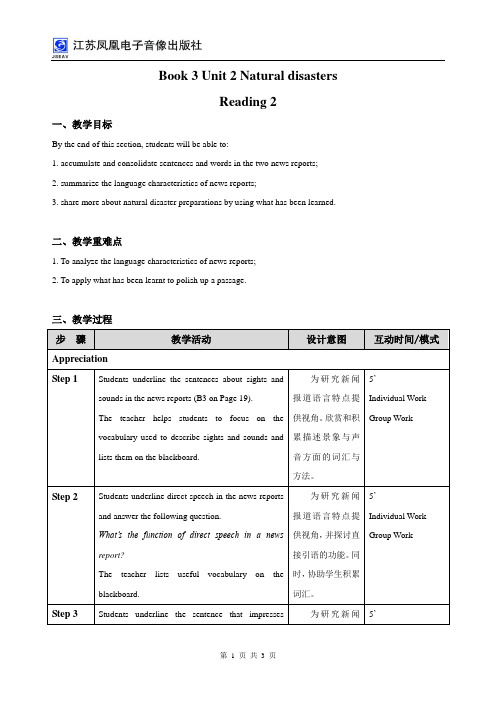
Book 3 Unit 2 Natural disastersReading 2一、教学目标By the end of this section, students will be able to:1. accumulate and consolidate sentences and words in the two news reports;2. summarize the language characteristics of news reports;3. share more about natural disaster preparations by using what has been learned.二、教学重难点1. To analyze the language characteristics of news reports;2. To apply what has been learnt to polish up a passage.三、教学过程步骤教学活动设计意图互动时间/模式AppreciationStep 1 Students underline the sentences about sights and sounds in the news reports (B3 on Page 19).The teacher helps students to focus on thevocabulary used to describe sights and sounds andlists them on the blackboard.为研究新闻报道语言特点提供视角。
欣赏和积累描述景象与声音方面的词汇与方法。
5’Individual WorkGroup WorkStep 2 Students underline direct speech in the news reports and answer the following question.What’s the function of direct speech in a newsreport?The teacher lists useful vocabulary on theblackboard.为研究新闻报道语言特点提供视角,并探讨直接引语的功能。
译林版高中英语选必三Unit2 Reading I 教案(雅礼版)

Unit 2 Out of this worldWelcome to the unit & Reading (I)◆内容分析:本单元的主题语境是“人与自然”,话题是“太空探索”,涉及的语篇类型有视频、讲座文稿、漫画和杂志文章等。
本单元的教学旨在引导学生深入思考人类探索宇宙的意义并学习宇航员奋勇前进、直面挑战的宝贵品质,培养学生对未知世界的好奇心与探索精神,加深学生对国家航天科技发展的认识,增强民族自豪。
Welcome to the unit板块通过一段视频呈现四项太空探索方面的重大突破,以此导入单元话题,激发学生对本单元话题的学习兴趣; Reading板块是一篇讲座文稿,介绍宇航员的优秀品质。
本单元卷首的名人名言出自中国科幻作家刘慈欣的小说《朝闻道》,意为:“对宇宙终极真理的追求,是文明的最终目标和归宿。
”这句话旨在说明对宇宙的探索标志着人类文明的最高境界。
◆教学目标:By the end of this section, students will be able to1. understand the quote highlighting the importance of learning from the past;2. grasp basic information of the two explorers and their achievements;3. share information about dynasties and historical figures;4. understand the spirit of exploration and demonstrate this spirit in their daily lives cultivate a strong sense of national pride.◆教学重难点:1. Make a comparison between the two explorers;2. Identify typical features of the historical article;3. Use facts to illustrate points of view.◆教学过程:Step 1 Lead-inLead in: Ask the student to read this quote and share their understanding of this sentence.The pursuit of the ultimate truth of the universe is the final objective and destination of civilization. —Liu Cixin【设计意图:紧扣主题,用学生熟悉的名人名言来激活学生已有的知识和经验,引入主题。
英语人教版八年级下册unit2SBreading

Section B Reading
Learning Aims:
1.Students
can read the letter .
2. Finish the tasks in the group. 3.know the friendship between humans and animals and how to help disabled people.
this, but many people have these difficulties. I can’t use my arms or legs well, so normal things like answering the telephone, opening and closing doors, or carrying things are difficult for me. Then one day last year, a friend of mine helped me out. She talked to Animal Helpers about getting me a special trained dog. She also thought a dog might cheer me up. I love animals and I was excited about the idea of having a dog.
can get your point if you are right. you can lose point if you are wrong.
(游戏规则:每组轮流选择喜欢的主题,答对者加分, 答错者扣分.)
2020年高中英语UNIT3READINGII教案牛津译林版选择性必修第二册
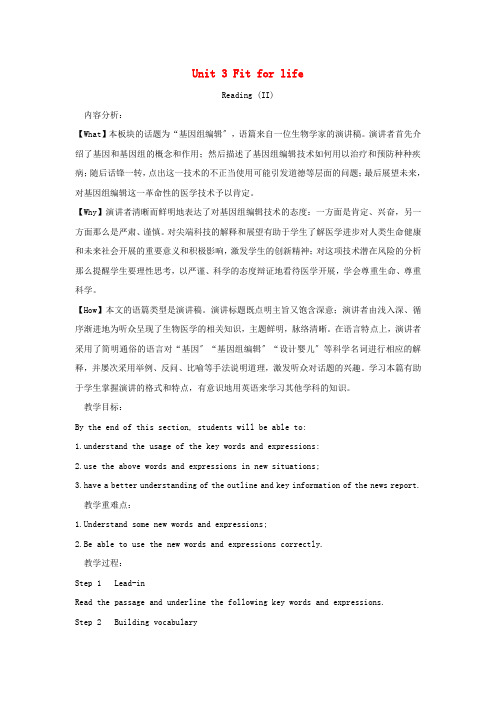
Unit 3 Fit for lifeReading (II)内容分析:【What】本板块的话题为“基因组编辑〞,语篇来自一位生物学家的演讲稿。
演讲者首先介绍了基因和基因组的概念和作用;然后描述了基因组编辑技术如何用以治疗和预防种种疾病;随后话锋一转,点出这一技术的不正当使用可能引发道德等层面的问题;最后展望未来,对基因组编辑这一革命性的医学技术予以肯定。
【Why】演讲者清晰而鲜明地表达了对基因组编辑技术的态度:一方面是肯定、兴奋,另一方面那么是严肃、谨慎。
对尖端科技的解释和展望有助于学生了解医学进步对人类生命健康和未来社会开展的重要意义和积极影响,激发学生的创新精神;对这项技术潜在风险的分析那么提醒学生要理性思考,以严谨、科学的态度辩证地看待医学开展,学会尊重生命、尊重科学。
【How】本文的语篇类型是演讲稿。
演讲标题既点明主旨又饱含深意;演讲者由浅入深、循序渐进地为听众呈现了生物医学的相关知识,主题鲜明,脉络清晰。
在语言特点上,演讲者采用了简明通俗的语言对“基因〞“基因组编辑〞“设计婴儿〞等科学名词进行相应的解释,并屡次采用举例、反问、比喻等手法说明道理,激发听众对话题的兴趣。
学习本篇有助于学生掌握演讲的格式和特点,有意识地用英语来学习其他学科的知识。
教学目标:By the end of this section, students will be able to:1.understand the usage of the key words and expressions:e the above words and expressions in new situations;3.have a better understanding of the outline and key information of the news report. 教学重难点:1.Understand some new words and expressions;2.Be able to use the new words and expressions correctly.教学过程:Step 1 Lead-inRead the passage and underline the following key words and expressions.Step 2 Building vocabulary1.Word study: contractIntroduce the meaning of “contract〞 through different situations, first the context of the speech and then other situations.Collocations of “contract〞.Exercises of “contract〞: Practice makes perfect.Tests found that they were more likely to feel a sense of fear at the moment when their heats are ___________ (contract) and pumping blood around the bodies. Other organizations such as banks ask customers to sign long ___________ (contract) they may not read or understand.It criticizes the main ___________ (contract) for seriously erring in their estimates.2.Word study: identifyIntroduce the meaning of “identify〞 through different situations, first the context of the speech and then other situations.Collocatio ns of “identify〞.Exercises of “identify〞: Practice makes perfect.He was too far away to be able ___________ (identify) faces.Scientists ______________ (identify) a link between diet and cancer.You should not identify wealth ___________ happiness.3.Word study: relateIntroduce the meaning of “relate〞 through different situations, first the context of the speech and then other situations.Collocations of “relate〞.Exercises of “relate〞: Practice makes perfect.In the future, pay increases will ___________(relate) productivity.He ___________(relate) the facts of the case ___________ journalists.According to experts, the amount of time spent watching TV ___ ___ _____ ___ (not relate) reading ability.4.Word study: applyIntroduce the meaning of “apply〞 through different situations, first the contextof the speech and then other situations.Collocations of “apply〞.Exercises of “apply〞: Practice makes perfect.The advertisement for engineers on the Internet attracted many ___________ (apply).The man’s ___________(apply) for membership of the club was turned down. Apply the cream evenly ________ your face and neck.6.Word study: restoreIntroduce the meaning of “restore〞 with through different situations, first the context of the speech and then other situations.Exercises of “restore〞: Practice makes perfect.The family not only returned the important documents to us that day but also ___________ (restore) our faith and trust in people.The ___________ (restore) took about four years.7. Word study: fundamentalIntroduce the meaning of “fundamental〞 together with relevant exercises. Exercises of “fundamental〞: Practice makes perfect.Fresh air is fundamental _______ good health.In line with this, Jeff Warren tells us that the way we sleep has changed _____________ (fundamental) since the invention of artificial lightning and the electric bulb.8. Word study: ariseIntroduce the meaning of “arise〞 together with relevant exercises. Exercises of “arise〞: Practice makes perfect.A number of high buildings ______ ______ (arise) where there was nothing in a year, but ruins.Accidents often arise ______ carelessness.Not all problems ____________ (arise) from social discrimination can be addressed through communication.9. Word study: restrictIntroduce the meaning of “restrict〞 together with relevant exercises. Exercises of “restrict〞: Practice makes perfect.This time as an expert witness, he used environmental protection laws to explain __________ (restrict) on development in and around wetlands.The biggest __________ (restrict) on our resources is the number of hours we can devote to something, so we look to maximize the return we get on our investment of time.On top of that, most of the 3D food printers now __________ __________ (restrict) to dry ingredients, because meat and milk products may easily go bad.10. Word study: prohibitIntroduce the meaning of “prohibit〞 together with relevant exercises. Exercises of “prohibit〞: Practice makes perfect.The plastic bags________ __________ (prohibit) in some 90 cities in California, including Los Angeles.Please note that any __________ (prohibit) items will be taken away by the Office of Residence Life.In 1897, the state of Michigan passed a law __________ (prohibit) the killing of passenger pigeons.11. Word study: resistanceIntroduce the meaning of “resistance〞 together with relevant exercises. Exercises of “resistance〞: Practice makes perfect.The __________ (resist) to vaccine has continued for decades, and it is driven by a real but very small risk.The more pesticides are used, the more __________ (resist) the insects become. It is the easiest of crops to grow and is seemingly __________ (resist) to any disease.12.Phrase study: put...in placeIntroduce the meaning of t he phrase “put...in place〞 together with some relevant phrases.13.Phrase study: work to one’s advantageIntroduce the meaning of the phrase “work to one’s advantage〞. Step 3 Consolidation1. Exercises to review the knowledge learned;2. Finish B1 on P33.教学反思。
译林版高中英语选必三Unit2 Reading II 教案(雅礼版)
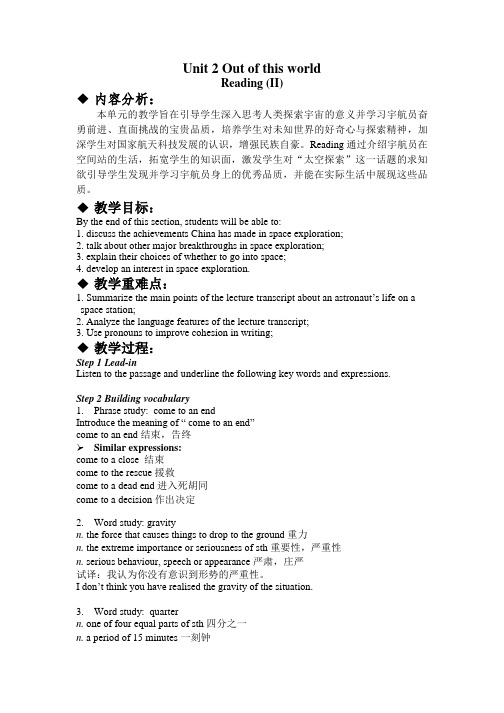
Unit 2 Out of this worldReading (II)◆内容分析:本单元的教学旨在引导学生深入思考人类探索宇宙的意义并学习宇航员奋勇前进、直面挑战的宝贵品质,培养学生对未知世界的好奇心与探索精神,加深学生对国家航天科技发展的认识,增强民族自豪。
Reading 通过介绍宇航员在空间站的生活,拓宽学生的知识面,激发学生对“太空探索”这一话题的求知欲引导学生发现并学习宇航员身上的优秀品质,并能在实际生活中展现这些品质。
◆教学目标:By the end of this section, students will be able to:1. discuss the achievements China has made in space exploration;2. talk about other major breakthroughs in space exploration;3. explain their choices of whether to go into space;4. develop an interest in space exploration.◆教学重难点:1. Summarize the main points of the lecture transcript about an astronaut’s life on a space station;2. Analyze the language features of the lecture transcript;3. Use pronouns to improve cohesion in writing;◆教学过程:Step 1 Lead-inListen to the passage and underline the following key words and expressions.Step 2 Building vocabulary1.Phrase study: come to an endIntroduce the meaning of “ come to an end”come to an end 结束,告终➢Similar expressions:come to a close 结束come to the rescue 援救come to a dead end 进入死胡同come to a decision 作出决定2.Word study: gravityn. the force that causes things to drop to the ground 重力n. the extreme importance or seriousness of sth 重要性,严重性n. serious behaviour, speech or appearance 严肃,庄严试译:我认为你没有意识到形势的严重性。
- 1、下载文档前请自行甄别文档内容的完整性,平台不提供额外的编辑、内容补充、找答案等附加服务。
- 2、"仅部分预览"的文档,不可在线预览部分如存在完整性等问题,可反馈申请退款(可完整预览的文档不适用该条件!)。
- 3、如文档侵犯您的权益,请联系客服反馈,我们会尽快为您处理(人工客服工作时间:9:00-18:30)。
It measures a country’s achievement through life
expectancy, education and income. 3. What are the first two Development Goals? To reduce poverty and hunger, and make sure that all children have education up to the age of 11.
2000年9月,在联合国千年首脑会议上,世界各 国领导人就消除贫穷、饥饿、疾病、文盲、环境 恶化和对妇女的歧视,商定了一套有时限的目标 和指标。即消灭极端贫穷和饥饿;普及小学教育 ;促进男女平等并赋予妇女权利;降低儿童死亡 率;改善产妇保健;与艾滋病毒/艾滋病、疟疾 和其他疾病作斗争;确保环境的可持续能力;全 球合作促进发展。这些目标和指标被置于全球议 程的核心,统称为千年发展目标(MDGs)。千年 发展目标——从极端贫穷人口比例减半,遏止艾 滋病毒/艾滋病的蔓延到普及小学教育,所有目 标完成时间是2015年——这是一幅由全世界所有 国家和主要发展机构共同展现的蓝图。这些国家 和机构已全力以赴来满足全世界最穷人的需求。
true (T) or false (F) according to the
text.(2ms ) 1. In 2000, 147 world leaders agreed to work together to reduce poverty after 2015. F 2. Life expectancy means that how long a person usually lives in the world. T
Find out the main idea of each paragraph.(10ms)
Main idea
Para. 1
Para. 2 Para. 3 Para. 4 How the Human Development Report came out. The H.D Index measures a country’s achievement. The five most important goals of the report. Examples of successful development in 2003
from Europe while the bottom 10
countries are all African countries.
F
Read the text aloud,paying attention to the pronunciation,especially the rhythm and stress. And then fill in the blanks with proper words and phrases.(3ms) sections One of the most important _______ of the Index Human Development Report is the Human _____. The Index measures country’s achievements in ________ a three ways: life expectancy, education and income _______. The list has some surprises Norway is ________. at the top ofthe list, _____ the US is at number 7. ___________ while Thebottom ten countries are all African countries. ______
The eight Millennium Development Goals (MDGs) – which range from halving extreme poverty to halting the spread of HIV/AIDS and providing universal primary education, all by the target date of 2015 – form a blueprint agreed to by all the world’s countries and all the world’s leading development institutions. They have galvanized unprecedented efforts to meet the needs of the world’s poorest.
____________ poverty. However, a great moved out of
many people in developing countries are _________
in the middle of China is ______________ the list. It is one of the examples of successful ___________. China increased life development by expectancy ___ 13 years. In the last ten years in China, 150 million people
Para. 5 Developed countries should give more financial help.
Read and answer the questions.(15ms)
1. What did world leaders agree to do in 2000? 2. What does the Human Development Index measure? 3. What are the first two Development Goals? 4. What progress have we made towards these goals? 5. What do developed countries need to do?
高一外研版必修三
Module 2
Developing and Developed Countries
Reading and Vocabulary Pronunciation
Reading and Vocabulary
Pre-reading:
Learn about 8 MDGs (3ms)
What’s this emblem?
The Human Development Report
Conclusion
We need to 8. make greater effort _______________ although we are making some progress.
Decide whether the following statements are
Read the text carefully and complete the following life expectancy Ways to 1. _____________ chart.(5ms) measure a Education country’s Income achieveThe ments Human poverty Five most Reduce 2. _______ and hunger; Develop -ment important Make sure that all children have Report Develop- education up to the age of 11; ment Fight AIDS and other diseases; Goals Improve 3. _______________ the environment for poor people _________________; Encourage developed countries to give more help to other countries.
4. What progress have we made towards these goals? There are some examples of successful development, like in China, but more effort is needed. 5. What do developed countries need to do? They need to elopment Goals
Millennium Development Goals
The eight Millennium Development Goals (MDGs) – which range from halving extreme poverty to halting the spread of HIV/AIDS and providing universal primary education, all by the target date of 2015 – form a blueprint agreed to by all the world’s countries and all the world’s leading development institutions. They have galvanized unprecedented efforts to meet the needs of the world’s poorest
Examples China increased life expectancy of by 4. 13 years in nine years. _______ The successful In the last ten years, 150 million Human developpeople have moved out of poverty Develop- ment in China. ment Every day 799 million people in Report 5. challenges _________ developing countries suffer from 6. hunger _______. About 115 million children are not educated being 7. _________ in developing countries. Over 1 billion people do not drink safe water in developing countries.
